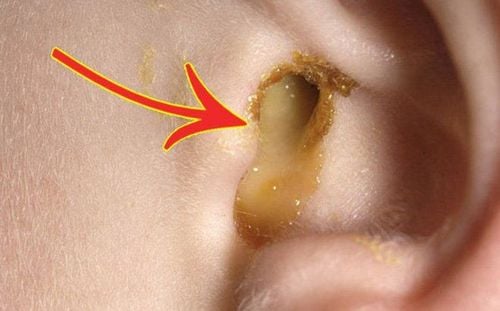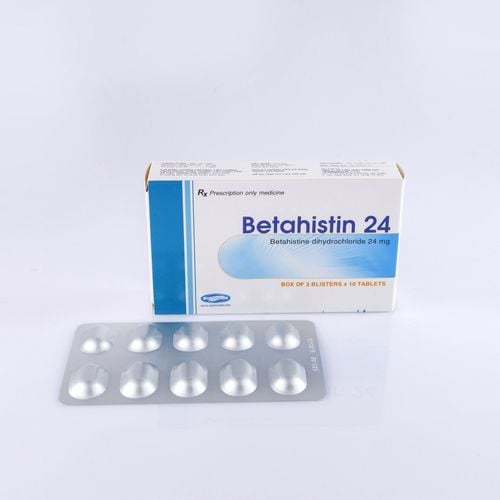This is an automatically translated article.
Most people when traveling by plane, during the flight have tinnitus. In fact, this is a very normal reaction when encountering unexpected high or low pressure. However, for those who have an ear disease, there should be certain attention to avoid influence. The article will help those who have ear disease and note when traveling by plane.
1. Why does tinnitus appear when traveling by plane?
Hearing is the most sensitive organ to air pressure, so when the pressure changes abnormally, it can increase (when traveling by plane) or can decrease (dive deep under water), all effects to organs in the body, including hearing, easily cause damage.
Airplane travel can cause hearing damage due to trauma to the eardrum and ear tissue due to the pressure difference between the cabin and the middle ear. Tinnitus when flying is because each ear has an Ot-tat tube - the tympanic tube connecting the middle ear to the throat, the nose is responsible for regulating the pressure in the ear. The feeling of tinnitus is most pronounced when the plane begins to take off, when starting to descend to land, occurs when the Ot-ta tube is blocked due to congestion, imbalance of pressure on the eardrum.
Ear barotrauma is trauma to the eardrum and middle ear tissue caused by a pressure difference in the middle ear and the cabin. This difference is most pronounced when the plane starts to take off, when the aircraft climbs too quickly as well as descends when it lands. If mild, it causes tinnitus, dizziness, if the eustachian tube is completely blocked, the pressure change is large enough to cause fluid accumulation or bleeding in the middle ear. In addition, accompanied by symptoms of ear pain, caused by the eardrum being pulled.

Đa số những người đi máy bay sẽ bị ù tai
2. The dangers of tinnitus when traveling by plane
The common cold is the most common cause of eustachian tube blockage causing earache symptoms during flight.
Other factors can lead to pain, tinnitus when traveling by plane due to an ENT-related illness such as sinusitis or allergic rhinitis such as hay fever.
Nasal congestion is also associated with eustachian tube obstruction due to bulging tympanic membrane blocking the opening of the eustachian tube.
3. Tinnitus when flying is dangerous?
Ear damage such as tinnitus sometimes occurs with sudden changes in altitude or depth.
This is a normal state and is mostly harmless to health. Tinnitus can go away on its own after hitting the ground, but if an ear injury such as tinnitus occurs too often, it will cause damage. more serious complications.
It is important to see a doctor to be examined, to distinguish chronic or acute ear damage so that it can be treated promptly, avoiding permanent damage for a long time.

Ù tai khi đi máy bay là triệu chứng bình thường
4. Symptoms of ear disease caused by airplane travel
Feeling of pressure in the ear Dizziness, dizziness Ear discomfort, ringing in the ears Mild hearing loss, more difficulty hearing A stuffy or full feeling in the ear Some signs of more serious ear injury include : Middle ear pain Feeling of pressure in the ear Nose bleeding Moderate or severe hearing loss Eardrum damage
5. Can you fly with a perforated eardrum?
The answer is yes. If the eardrum is perforated due to trauma or inflammation, it can heal on its own, the ability to recover is fast and highest in young people. If it does not heal on its own, an atrial patch will be performed. You should see your doctor to be checked to avoid the risk of longer causing inflammation or more severe perforation.
A perforated eardrum during a flight does not affect anything. However, if for people after performing atrial patching, the machine rides due to sudden pressure changes during take-off and landing, to avoid causing tinnitus to affect, it is necessary to perform the mouth-and-nose test. Gently bring air to the ear, this will help equalize the pressure inside and outside the eardrum. It is still best to rest, avoid flying if possible.

Người bệnh thủng màng nhĩ hoàn toàn có thể đi máy bay
6. How to deal with tinnitus when traveling by plane
If the ears are blocked during flight, it can be in the following way:
Step 1: Close your nose
Step 2: Fill your mouth with air
Step 3: Using your cheek and throat muscles, gently push air in behind the nose as if you were to push your thumb and the fingers would pop out of the nose.
When you hear a loud sound in your ears, success. If your ears are still clogged after landing a few hours, see your doctor.
Notes when flying when you have an ear disease
Measures that can help prevent or reduce tinnitus or the risk of ear injury can be applied when traveling by plane:
Do not fly when sick colds, congestion or respiratory infections when not needed.
Use a decongestant such as oxymetazolin nasal spray or a pseudoephedrine one hour before takeoff and one hour before landing. Medicines can help prevent blocked tubes. However, it is necessary to consult a doctor before using
Can yawn to open the eustachian tube or chew gum when feeling the symptoms of tinnitus to stimulate swallowing
Continuously clear the ear with by gently swallowing air while closing your nose and mouth
Using earplugs with filters, this small device helps to slowly balance the pressure on your eardrums during takeoff and landing. This product is very effective for those who have just had ear surgery to avoid drafts.
Drink plenty of water to avoid dehydration, dry saliva. Avoid alcohol and coffee as they will constrict the blood vessels.

Người có bệnh lý về tai nên uống nhiều nước khi đi máy bay
International General Hospital is not only equipped with modern medical equipment and facilities according to international standards, but also has a team of highly qualified doctors and nurses to help diagnose and treat quickly and effectively. effective, bringing comfort to the patient during examination and treatment.
Please dial HOTLINE for more information or register for an appointment HERE. Download MyVinmec app to make appointments faster and to manage your bookings easily.













